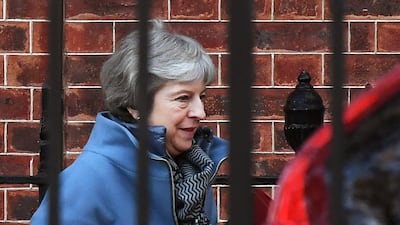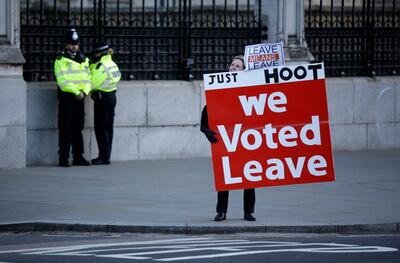Britain’s beleaguered Prime Minister Theresa May suffered her first – but unlikely to be her last – Parliamentary defeat of 2019 when an amendment to a finance bill that had cross-party support in the House of Commons was passed by 303 to 296 votes.
The amendment, which was tabled by former cabinet ministers Yvette Cooper (Labour) and Nicky Morgan (Conservative), seeks to impose conditions to prevent the government from raising taxes in the event of the country crashing out of Europe with no deal with the EU.
The government would only be allowed to raise taxes if there is either a deal, an extension to Article 50 which would keep the country in the EU until a deal was made, or if there has been a Commons vote authorising a no-deal Brexit.
_______________
Read more:
Britain’s battle over Brexit resumes ahead of big vote
Election threat rises as May sets Brexit vote for 15th
Lorries take part in planned traffic jam as UK prepares for no-deal Brexit
_______________
The prime minister’s spokesman had indicated earlier on Tuesday that defeat on the amendment would not be “desirable”, but that “the effect of the amendment on no-deal preparations would be inconvenience, rather than anything more significant.”
Liam Fox, the international trade secretary, called the amendment “irresponsible” as it would tie the hands of the government. He told the BBC: “The government has to ensure that all eventualities are covered. It maybe that we cannot get agreement with the EU and that we have to leave without an agreement in which case the UK has to be prepared.”
With the Democratic Unionist Party having committed to vote with the government, it meant there needed to be a sizeable revolt by Conservative MPs for the amendment to pass. In the event, 20 Tories voted for the measure.
Six former cabinet ministers – Ken Clarke, Michael Fallon, Justine Greening, Dominic Grieve, Oliver Letwin and Nicky Morgan – backed the amendment, as well as party grandees such as Oliver Letwin and Nicholas Soames, and Remain rebels Jonathan Djanogly, Heidi Allen and Sarah Wollaston.
After the result was announced, Labour leader Jeremy Corbyn turned in his seat on the opposition front bench and applauded Ms Cooper, who he beat in the party’s 2015 leadership election, giving her a big thumbs up.
In a statement, Mr Corbyn said: “This vote is an important step to prevent a no-deal Brexit. It shows that there is no majority in parliament, the cabinet or the country for crashing out of the EU without an agreement. That is why we are taking every opportunity possible in parliament to prevent no deal. Theresa May must now rule out no deal once and for all.”
While the amendment in itself will not bind the government to any set course of action, the vote showed the scale of opposition among MPs for ‘no deal’ – with a narrow but clear majority against it.
As Sky’s political editor Faisal Islam tweeted: "This is the start of constitutional trench warfare where Parliament will try to assert its power over the executive to prevent No Deal – highly significant. As is the open expression that UK not ready for No Deal from likes of Letwin and Boles.”


